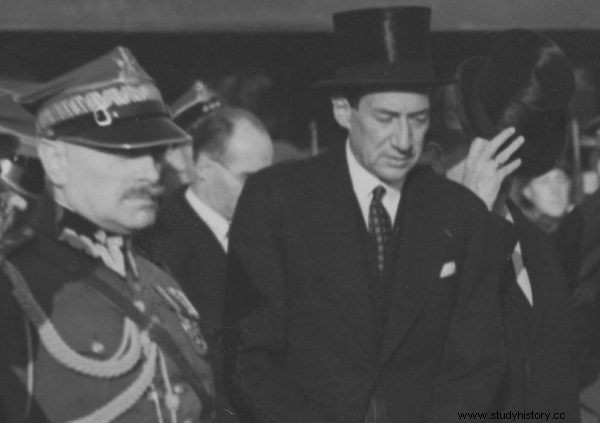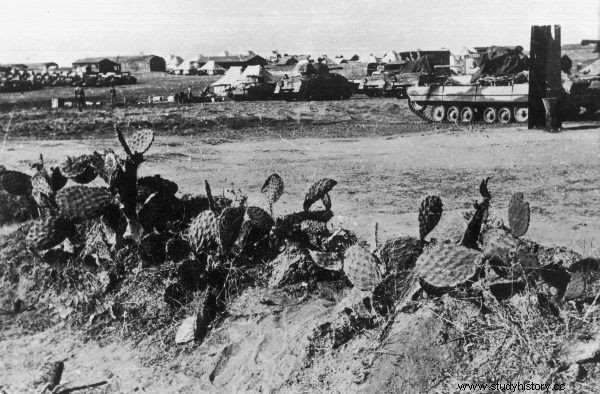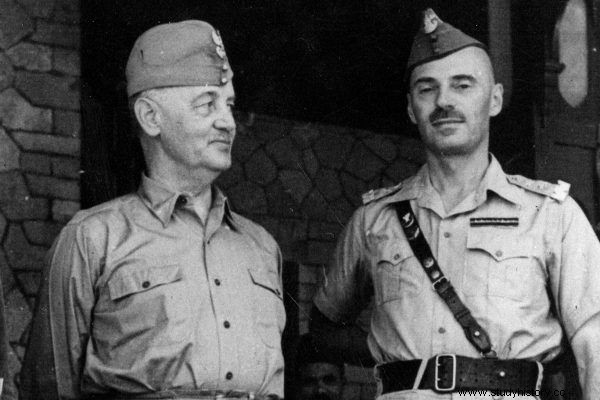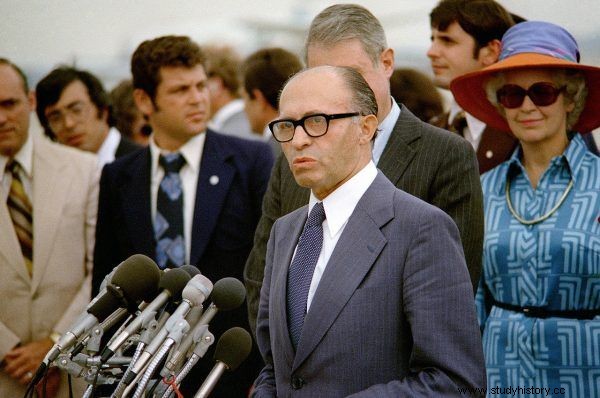Weapons, money, and above all, trained volunteers. Poles started supporting Jewish independence organizations before the war. However, most of the later Israeli army owed the Anders Army. How big was the participation of Polish generals in the creation of the Jewish state?
In 1936 in Warsaw, representatives of Jewish independence organizations held a series of meetings with the Polish authorities. In talks with the Prime Minister, General Felicjan Sławoj Składkowski, and Józef Beck, the minister of foreign affairs, they sought support for the national Zionist movement.
The aftermath of these negotiations were subsidies for Jewish organizations and military training for the cadres of the forming Israeli army. Even before the outbreak of the war, as part of the Polish Military Training, between 8,000 and 10,000 young Jews from the Bejtar organization were trained. A three-month officer course for future commanders was also organized.
Polish aid also included the supply of weapons. It was smuggled to Palestine in agricultural and construction machinery, and even in the belongings of Jews emigrating from Poland. In total, by September 1, 1939, about 3,000 infantry rifles, 220 machine guns, 10,000 grenades and 3 million rounds of ammunition were "exported" in various ways. . The entire procedure was carried out under the supervision of Polish intelligence officers.
Jews in the 2nd Polish Corps
During World War II, the armed Jewish organizations in Palestine initially used the British training facilities. Under the watchful eye of English officers, they managed to recruit several thousand people. It was possible thanks to the support they gave to the islanders in the face of the expected threat from the German side.

In the 1930s, politicians of the highest rank participated in talks with representatives of Jewish independence organizations. There were also Prime Minister Składkowski (first in uniform on the left) and Minister Beck (source:public domain).
The British authorities, however, soon withdrew from this arrangement, which was beneficial for the Jewish state-building movement. They concluded that in this way they could raise a potential enemy in their own area.
The Jews still desperately needed trained fighters. And then the Poles unexpectedly appeared on the stage again. The Polish army, commanded by General Władysław Anders, arrived in Palestine. And in it… already trained Jewish soldiers. About 4.5 thousand of them served directly in the military branches. In total, in the structures of Anders' army there were about 6,500 people of Jewish nationality .
When the Polish military camps were located in remote areas, Anders' army had little contact with Jewish fighters. Gradually, however, the soldiers began to leave on leave and get to know the locals. At the same time, Jewish independence organizations, especially the Haganah, infiltrated the camps to conduct well-directed agitation there. We didn't have to wait long for the effects of these treatments.
I report that I will desert tomorrow!
The first desertions of Jews from the Anders Army began in August 1943. Their scale was impressive:in about five weeks, about 800 Jews left the Polish ranks. It was certainly not a spontaneous action. It was actively supported by Zionist organizations. They provided guides for refugees, provided cars, and helped arrange civilian clothes and a new identity.
How is it possible that so many people managed to flee the army in such a short time? Everything indicates that desertions of soldiers of Jewish origin took place ... with the knowledge and approval of the Polish command . There have even been cases where the future "defector" underwent additional sabotage and sabotage training before escaping.
Polish soldiers, especially officers, understood the intentions of their Jewish colleagues. The memories of one of them are quoted in the book “The Accursed Army. The Odyssey of Anders' Army ”Kacper Śledziński:
The soldier was just going on leave and never coming back. In such cases, the regiment was obliged to draw up an arrest warrant and submit it to the corps command. As the number of accidents increased, the colonel ordered me to take care of this case. We discussed this issue in the casino. The attitude of our officers towards him was unanimous:if the loyalty of these refugees is on the side of Israel, then let them go. The colonel reminded us to avoid harassment. We didn't have any problems with that .

After the 2nd Corps reached Palestine, desertions of Orthodox soldiers became a problem. The command had no intention of pursuing them, however. The photo shows the 6th Armored Regiment of Lviv Children in Palestine (source:press materials of the Znak Horyzont publishing house).
In total, over 3,000 soldiers of Jewish nationality left the ranks of the 2nd Polish Corps. With the command of the commanders to this practice, some "escapes" turned into a farce. For example, if a Jewish soldier informed the Polish superior of his intention in this way:
- Captain, I report that I will desert tomorrow!
- In that case, soldier, good luck .
Family, holy
The Polish authorities reacted with equal caution to the news of the dwindling ranks of the Palestinian army. Of course, General Anders could not remain idle. After all, all soldiers were under a military oath of allegiance to the Commonwealth, and desertion was punishable by death. There was also pressure from the British. Convinced of Polish anti-Semitism, they wanted Polish troops to take part in the search for deserters.

Neither the Commander-in-Chief, General Sikorski, nor the commander of the 2nd Corps, General Anders, saw any sense in pursuing Jewish deserters from the ranks of the Polish Army (source:press materials of the Znak Horyzont publishing house).
The general sent a report to the Polish authorities in London informing about the problem of "disappearing" soldiers of Jewish origin. The response from the UK, however, was conservative. It was limited to ordering the fugitives to be written down and handing the list over to the British. The Polish military police were to take no action at all. Anders writes about this issue in his memoirs as follows:
The desertions of so many Jews, some of them well-trained, caused significant gaps in the troops. I did not allow the search for deserters, and not a single deserter has been arrested by us. I decided not to apply strictly to national minorities the Act on the universal obligation to perform military service of Polish citizens outside the country. I did not want to have soldiers under the command who do not want to fight.
General Kazimierz Sosnkowski probably also took a favorable position in the case of Jews deserting from the ranks of the Polish army. After the tragic death of General Władysław Sikorski, he assumed the position of the Commander-in-Chief. Probably his sister-in-law, Dr. Teresa Lipkowska, convinced the new supreme commander to treat the fugitives mildly. After the evacuation of the Anders Army from the Soviet Union, it settled permanently in Palestine. There she became a sympathizer of the Jewish armed organization Irgun.

When the desertions of Jews began, Lipkowska tried to force her brother-in-law to order the search for refugees to cease. She argued that these soldiers do not flee the battlefield, but on the contrary - choose a much more difficult and dangerous fight . And it is possible that, by the decision of the Commander-in-Chief, the matter was finally settled.
Terrorists, politicians and the military
And what were the fate of the soldiers who escaped from Anders' Army? The most famous defector was a law graduate of the University of Warsaw, and then a corporal of the 5th Kresowa Infantry Division, Mieczysław Biegun. He soon became known to the whole world as Menachem Begin. After escaping from the Polish army, he joined the ranks of the Irgun. He quickly became its leader and became famous as the "father" of Middle Eastern terrorism.
It was on the initiative of Begin that the Irgun carried out the first-ever terrorist attack with the use of a car-trap on July 22, 1946. Half a ton of explosives collapsed part of the King Dawid Hotel in Jerusalem as a result of the explosion. 91 people were killed then and several dozen were injured.

One of the defectors from the Anders Army was, among others, the later Prime Minister of Israel, Menachem Begin. In a photo taken in 1978 during a visit to the USA (source:public domain).
In the decades that followed, Begin devoted himself to politics. In 1977 he became Prime Minister of Israel. A year later, in December, he was awarded the Nobel Peace Prize for signing a peace agreement with Egypt. He headed the Israeli government until September 15, 1983, when he resigned and eventually withdrew from political life. He died in 1992.
There is no doubt that the soldiers trained by Poles, led by Begin, significantly strengthened Jewish independence organizations. Haganah and Irgun later became the backbone of the Israeli army. They were merged after Israel proclaimed independence (May 14, 1948). The resulting Israeli Defense Forces numbered approximately 35,000 troops. It was a major asset that allowed the young Jewish state to be defended against the invasion of Arab states. Would it be possible without Polish support? Theoretically, taking into account both the people trained before the war in Poland and the deserters from the Anders Army, every third of the soldiers who then defended Israel could have been handled by our officers.
